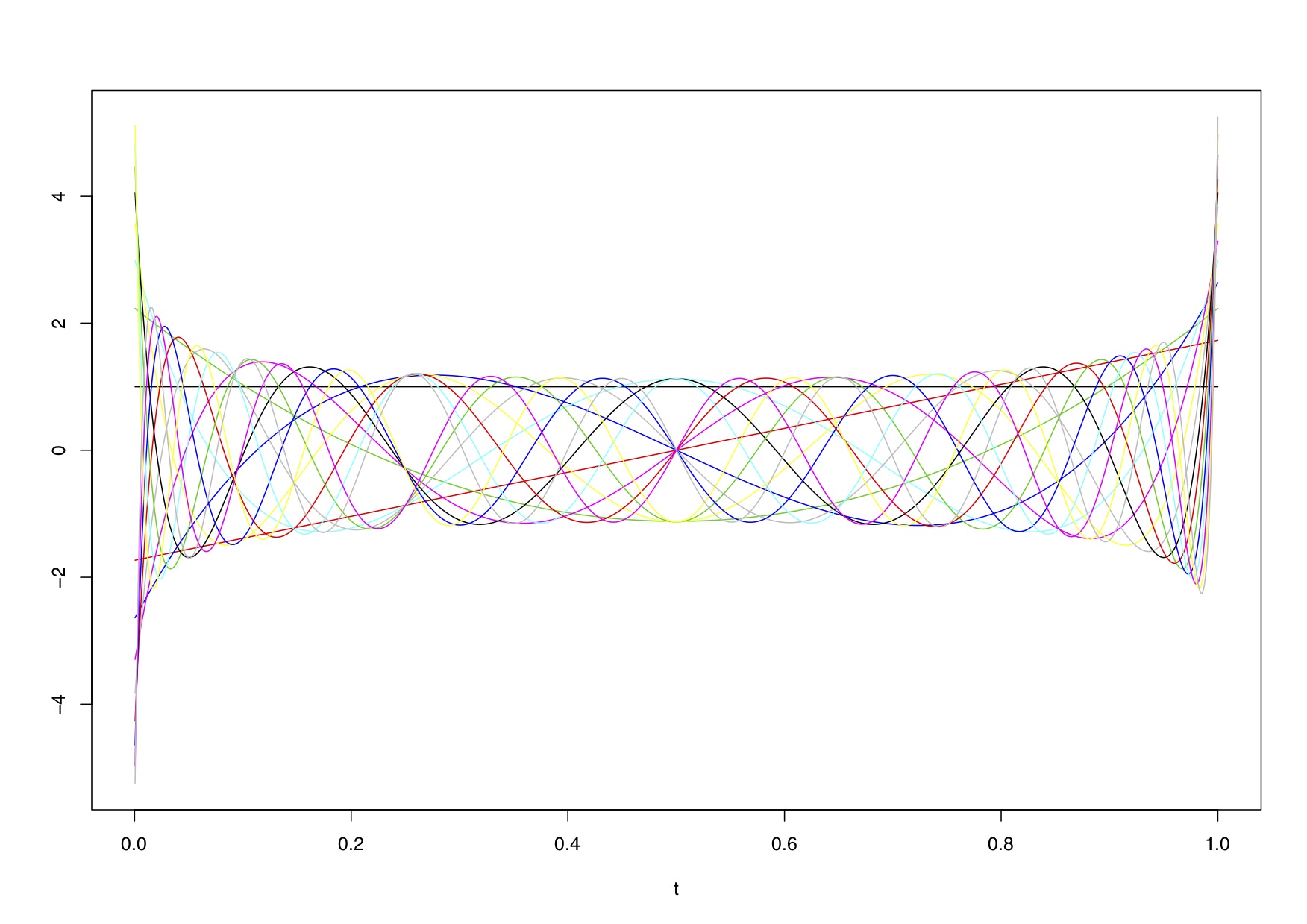Functional Data Analysis STAN 46 (7.5p)
Spring 2018
Components: 10 lectures, 5 lab sessions, 5 special topic/discussion sessions,

Functional Data Analysis STAN 46 (7.5p)
|

|
Course description:
In many practical problems originating from areas like geophysical sciences, astronomy, medicine, etc., the observations often correspond to measurements of a continuous process, which is a function of time and/or space. With rapid advances in technology, such measurements are becoming more and more frequent, thus pushing the boundaries of high-dimensional data analysis. In data science, high dimensional problems are often approached through dimension free analysis by treating an observation as a function. This is one way to circumvent the technical aspects identified with analyzing high-dimensional data, and thus avoiding the curse of dimensionality. This course is meant to introduce the students to various aspects of dimension free analysis, which obviates the technical and computational hurdles associated with high dimensional data. This way of dealing with high dimensional data is an emerging and rapidly developing field that requires understanding both established methods and newly adopted techniques. The primary objective of this course will be to focus on the application of functional data analysis techniques to real world problems, and thus, mathematical rigor is often traded for adaptability to applications.
Beginning with the basics of the analysis of data that may be considered to be ``functions'', this course will discuss various visualization and data exploration techniques. Specifically, the course will extensively deal with nonparametric spline smoothing, functional linear models, functional PCA, regularization methods, analysis involving derivatives, registration and nonlinear smoothing.
Students are required to work on projects to apply the techniques on real world problems. The preferred software for this course will be `R' and/or Python, however, the students are permitted to use any mathematical software of their liking that have facilities to perform all task in the course (Matlab being one example). Project discussions will enable students to share and compare ideas with each other and to receive specific guidance from the instructors. Efforts will be made to help students to embed real-world problems into mathematical models so that suitable algorithms can be applied with consideration of computational constraints. By surveying special topics, students will be exposed growing range of new methodologies.
Learning outcomes:
Textbooks:
Supporting computer package:
All projects and exercises can be completed using
| Week # | Day | Time and Location | Lecture/Lab/Discussion # | Material | Handouts/Reading material |
|---|---|---|---|---|---|
| 17 | Monday, 23/04/2018 | 09:15-11:00, E1:369 (Blue Room) | Lecture 1: : The concept of functional data and examples | Overview , | |
| 13:15-15:00 E1:369 (Blue Room) | Lecture 2: Representing functional data in functional bases | Orthonormal bases | |||
| Wednesday, 25/04/2018 | 09:15-11:00 E1:369 (Blue Room) | Discussion 1: Basis decomposition of a function. | Assignment 1 | ||
| 18 | Wednesday, 02/05/2018 | 09:15-11:00 E1:369 (Blue Room) | Lecture 3: Locality and smoothing: wavelets and splines | Wavelets and splines, | Code to be used in Lab 1 |
| 15:15-17:00, Alfa1:0043 | Lab 1: Introduction to fda package, working with functional bases and regularization | Topics for Lab 1 | |||
| Friday, 04/05/2018 | 09:15-11:00 E1:369 (Blue Room) | Discussion 2: Splines and regularization | Assignment 2 | ||
| 19 | Monday, 07/05/2018 | 09:15-11:00 E1:369 (Blue Room) | Lecture 4: Exploratory data analysis of functional data | Descriptive functional statisitcs | |
| 13:15-15:00 E1:369 (Blue Room) | Lecture 5: Mathematical model of functional data | FDA model | |||
| Wednesday, 09/05/2018 | 09:15-11:00 E1:369 (Blue Room) | Discussion 3: Eigenfunctions | Assignment 3 | ||
| 20 | Monday, 14/05/2018 | 09:15-11:00 E1:369 (Blue Room) | Lecture 6: Inference for functional data | Statistical Inference | Code to be used in Lab 2 |
| 13:15-15:00 E1:369 (Blue Room) | Lecture 7: Functional principal component analysis | FPCA | |||
| Wednesday, 16/05/2018 | 09:15-11:00 | Lab 2: Smoothing and PCA | Lab 2 | ||
| 21 | Monday, 21/05/2018 | 10:15-12:00 E1:369 (Blue Room) | Lecture 8: Functional linear models | Linear models | |
| 13:15-15:00 E1:369 (Blue Room) | Discussion 4: Functional regression - properties | Functional Regression | |||
| Wednesday, 23/05/2018 | 09:15-11:00 | Lab 3: Data Analysis for linear models | |||
| 22 | Monday, 28/05/2018 | 09:15-11:00 E1:369 (Blue Room) | Lecture 9: Functional autoregressive models | ||
| 13:15-15:00 E1:369 (Blue Room) | Discussion 5: Functional autoregression | ||||
| Wednesday, 30/05/2018 | 09:15-11:00 | Lab 4: Example with autoregressive functional data | |||
| Friday, 01/06/2018 | 09:15-11:00 E1:369 (Blue Room) | Lecture 10: Dynamical functional model | |||
| 09:15-11:00 | Lab 5: Example with dynamical functional data |
Comprehensive Exam: The work throughout the course will be compounded into one comprehensive examination paper. It will comprise three parts:
The final grades will be assigned according to the following table:
| Percentage | Grade |
|---|---|
| 49 - 0 | F |
| 54 - 50 | E |
| 64 - 55 | D |
| 74 - 65 | C |
| 84 - 75 | B |
| 100 - 85 | A |